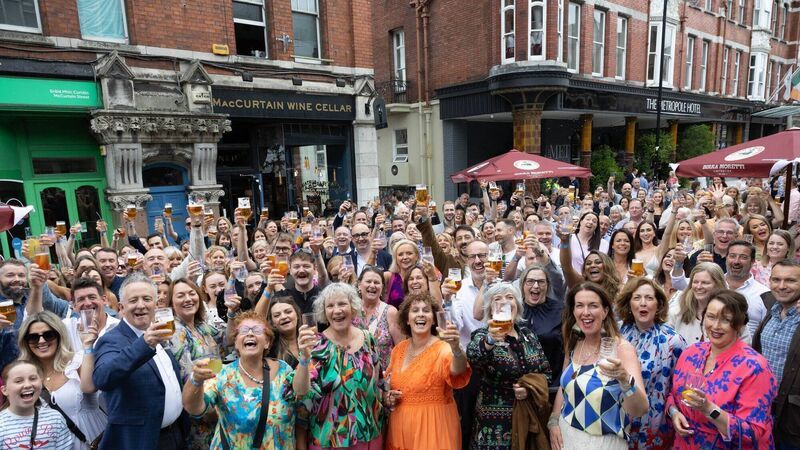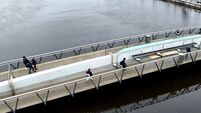Cork on a Fork cost just over a quarter of a million euro over three years

Set up after the height of covid to support the restaurant and hospitality sector, the Cork on a Fork festival has seen a 60% increase in footfall year-on-year, with many free events and €240,000 worth of sales for ticketed events including headliners such as the shared table event on MacCurtain Street. Picture: Darragh Kane
Cork City Council spent just over a quarter of a million euro on its annual Cork on a Fork Fest over the last three years, with its spend increasing nearly 150% between 2022 and 2024, figures have shown.
The council explained that the festival was set up to support the restaurant and hospitality industry post-covid, and has grown each year in line with the cost increases and is now a key tourism driver for Cork city.
From 2022 to 2024, €256,058.84 in total was spent by the council on the festival, though this was offset by some third-party sponsorship in 2023 and 2024, making €209,738.84 the total cost to council, when the sponsorship cost is subtracted from the spend.
The amount of money spent, not including the offset from sponsorship costs, increased by more than 70% from 2022 to 2023, and another 45% from 2023 to 2024 — in two years, the amount the council spent rose 148%.
In total, 55% of costs fell under the banner of PR, social media, advertising, marketing, festival programming, and event management, with a total of €139,035.77 spent this way.
Just 20% or €50,145.19 was spent on event costs — of the remainder, 10% went on photography and videography, 8% on design and print, 8% on marquee, kitchen, and audiovisual equipment hire, and 0.5% on security, fencing, and waste, a cost only incurred in 2024.
A Cork City Council spokesperson told The Echo: “The city council is proud to support the Cork on a Fork festival given the food and hospitality sector’s economic, cultural and community importance to the city.
“Cork is home to more than 60% of Ireland’s artisan producers. The festival was established as a post-covid pilot initiative to support the restaurant and hospitality sector, and the wider city centre, but its phenomenal success and popularity has seen it grow to become a key event on Ireland’s food festival calendar, helping to promote the city nationally and internationally as a world-class food destination.”
The spokesperson added: “The festival is now a firmly established week-long event, which this year featured almost 160 individual events, almost a third of which were free and open to the public.”
The spokesperson added that the 2025 festival had 17,000 attendees — a 60% increase in footfall year-on-year, and some €240,000 worth of ticket sales for the ticketed events.
There was a total of 158 events — a 126% increase on 2024’s 70 events and a combined media reach of some €24m.
“The festival enhances the visitor experience in August, traditionally a quieter time for events, driving tourism and local footfall to the city.
“There is already anecdotal feedback from the hospitality sector of an increase in the number of domestic and international visitors travelling for this year’s festival, which was also advertised by Brittany Ferries as a key reason to visit Ireland using its direct ferry service from Cork to Roscoff.
“The event creates a real sense of community in the city’s hospitality industry and partnerships were formed between chefs and producers, and businesses who will continue to collaborate with each other. The festival also shines a spotlight on the positivity that multicultural influencers bring to the city.”
In 2022, a total of €49,370.58 was spent on the festival. This included just over €5,000 on design and printing, €7,800 on photography and videography, €3,000 on festival programming, event management, PR, social media, advertising and marketing and €5,000 on event costs, including speakers, MC, musicians, children’s activities, room hire, and accommodation.
In 2023, costs increased, but the council did have some income in the area of third-party sponsorship to the tune of €15,000.
Overall, the costs were €69,347.98, with €84k spent across areas including photography/videography (€6.6k), marquee, kitchen, and audiovisual equipment hire, (€6.6k) and design and printing (€7.7k).
The event costs (speakers, MCs, musicians, children’s activities, room hire, accommodation), increased sharply to €16,766.13, as did PR, social media, marketing, and advertising to €26,378.58, while festival programming and event management rose to €20,178.15.
In 2024, third-party sponsorship more than doubled to €31,320, but overall costs also increased sharply to a total of €91,020.28, with the council spending €122,340.28.
They spent €9,300 on photography/videography, €9,000 on design and printing, €27,700 on event costs, €13,300 on marquee, kitchen, and audiovisual equipment hire, €1,300 on security, fencing and waste, €17,300 on advertising (print, radio, and digital) and event tickets for press/competitions/influencers, as well as €44,000 for festival programming, event management, PR, social media, and marketing.







 App?
App?


